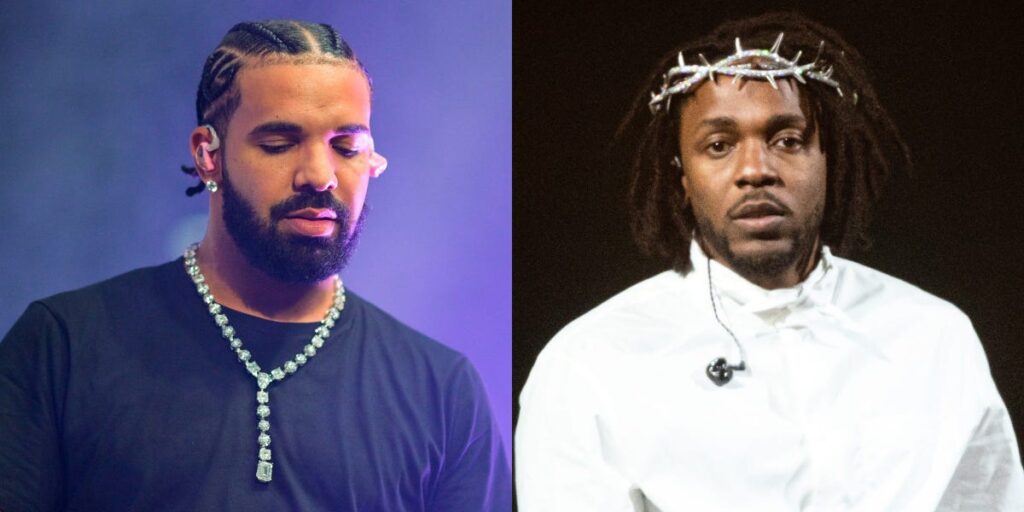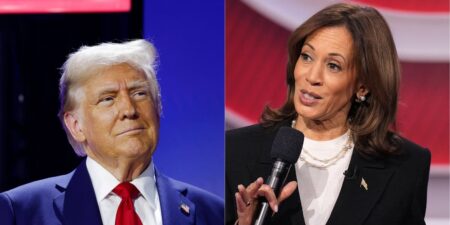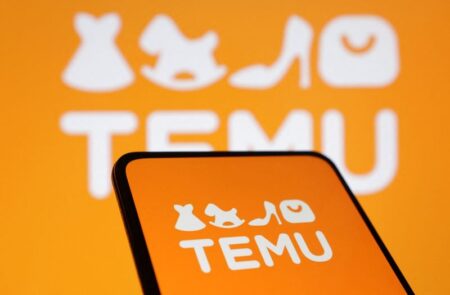Drake and Kendrick Lamar were once considered collaborators, perhaps even friends.
Both rappers lent features to the other’s 2011 albums (“Take Care” and “good kid, m.A.A.d city,” respectively) and even teamed up with A$AP Rocky for the 2012 hit “F**kin’ Problems.”
Over the years, however, Drake and Lamar came to represent very different versions of hip-hop greatness: the former is a commercial juggernaut, racking up No. 1 albums and breaking chart records set by The Beatles, while the latter is a Grammy darling and acclaimed lyricist who’s won a Pulitzer Prize.
Today, their separation is more apparent than ever: Drake and Lamar have become all-out foes.
In March, the Compton rapper used one simple line to reheat their long-simmering beef: “Motherfuck the big three, it’s just big me.”
The avowal appeared in Lamar’s guest verse for “Like That,” the sixth track on Future and Metro Boomin’s collaborative album “We Don’t Trust You.”
When the album was released, attentive rap fans noted Lamar’s sneaky reference to J. Cole’s guest verse in the 2023 Drake hit “First Person Shooter.”
“Love when they argue the hardest MC / Is it K-Dot? Is it Aubrey? Or me? / We the big three like we started a league,” Cole rapped, referencing Lamar’s nickname “K-Dot” and Drake’s birth name, Aubrey Graham.
While Cole backed down from the challenge, Drake did not. He released a pair of diss tracks aimed at Lamar, “Push Ups” and “Taylor Made Freestyle.”
In the former, Drake mocks Lamar’s height with a reference to his latest Grammy-winning album, “Mr. Morale & the Big Steppers.” (“How the fuck you big steppin’ with a size-seven men’s on?”) The latter track opens with AI-generated advice from Tupac Shakur, whom Lamar has frequently been compared to. This strategy backfired, drawing criticism and legal threats from Shakur’s estate; Drake removed the song from his social media.
Lamar finally responded after 11 days of silence, dropping an explicitly anti-Drake diss called “Euphoria.”
The song contains layered insults about his rival’s roots (“I’d rather do that than let a Canadian n**** make Pac turn in his grave”), Drake’s track record as a dad (“I got a son to raise, but I can see you don’t know nothin’ ’bout that”), and long-stewing plastic surgery rumors (“Tell ’em where you get your abs from”).
Even the title is likely a reference to Drake’s role as executive producer on HBO’s “Euphoria,” a show that’s been criticized for objectifying and sexualizing young girls. (None of the actors depicted having sex are actually teenagers.)
The drama didn’t stop there. Less than 72 hours later, Lamar released “6:16 in LA,” which sparked another response from Drake (“Family Matters“), which provoked two more jabs from Lamar (“Meet the Grahams” and “Not Like Us“), which finally led Drake to address criticism head-on (“The Heart Part 6“).
As of writing, the rappers have exchanged a total of nine diss tracks (including “Like That”) in a matter of weeks. It’s the latest in a long, storied history of rap feuds, but even so, there’s a lot to unpack here.
We broke down the key takeaways from hip-hop writers and culture critics.
After ‘Euphoria,’ critics said Lamar took round one
The unbridled energy of “Euphoria” has been widely praised by critics, even though Lamar’s rebuttal came later than fans expected.
“Drake’s ‘Push Ups’ and ‘Taylor Made Freestyle’ were solid efforts, but for my money, they didn’t hit as hard as the ‘Like That’ verse or ‘Euphoria,'” Angel Diaz wrote for Billboard. “This response was well worth the wait.”
Similarly, music journalist Sowmya Krishnamurthy commended Lamar’s patience, writing on Medium, “There’s a reason that he’s known as hip-hop’s reigning boogeyman.”
“What’s so great about ‘Euphoria’ is that it’s six minutes and 24 seconds of rapping. Straight bars,” Krishnamurthy wrote, comparing Lamar’s “vicious” lyrical skill to Drake’s “penchant for social media trolling and gimmicks.”
“This is a rap battle,” Krishnamurthy added. “The victor needs to showcase actual skill, wit, wordplay, and flow in order to take it.”
In a track review for Pitchfork, Alphonse Pierre argued that Lamar’s humor and passionate delivery help to sell the song — despite its underwhelming production and its lack of a “knockout blow.”
“He sounds like he’s been waiting years for this moment. ‘I hate the way that you walk, the way that you talk / I hate the way that you dress,’ he raps; cliché, but it works because he sounds like he really means it,” Pierre wrote.
Lamar declared, ‘I’m the biggest hater,’ and people are loving it
Drake is no stranger to diss tracks. Back in 2018, he was eviscerated by Pusha T’s “The Story of Adidon,” which Pierre said “set the bar for all future Drake teardowns.”
Pusha T promoted the release with an old photo of Drake in blackface. In the song, he revealed that Drake had quietly fathered a child with an adult film star.
By contrast, “Euphoria” isn’t especially specific or revelatory. Instead, what delighted critics is the sheer level of contempt that Lamar has been harboring for the Canadian chart-topper.
“This ain’t been about critics, not about gimmicks, not about who the greatest / It’s always been about love and hate, now let me say I’m the biggest hater,” Lamar raps.
The lyric is probably a reference to a Breakfast Club interview with DMX in 2012 in which the rapper declared, “I don’t like anything about Drake. I don’t like his fucking voice. I don’t like the shit he talks about. I don’t like his face. I don’t like the way he walks, nothing.”
Pop culture writer Hunter Harris applauded Lamar’s catty “war cry” in her newsletter “Hung Up,” noting, “The meanest thing you can possibly do is to hate someone just because.”
Zoe Guy echoed this sentiment in an article for Vulture, saluting Lamar for his “blatant honesty.”
“We can only hope Lamar never relinquishes the hate in his heart, because we could go for another fiery verse or two,” Guy wrote.
Music journalist Andre Gee agreed, contending that Lamar didn’t need a big reveal or accusation for the song to land — he only needed to be energized by his own personal disdain.
“Some diss songs make listeners perceive an artist differently, but other disses say things people are already thinking in ways that they can’t convey,” Gee wrote for Rolling Stone. “The Cardo and Kyuro-produced ‘Euphoria’ is the latter. Kendrick doesn’t say many new things, but the way he lobs his insults makes it a haymaker.”
Social media users also put Lamar in the lead
Producer and DJ Marseel said on X that Drake “lost the culture” after the “Euphoria” drop, while culture critic Shamira Ibrahim wrote, “I’m actually shook at how disgusted Kendrick is with Drake.”
The rapper and singer Tiger Goods celebrated Lamar’s Gemini spirit, writing, “Real haters are detailed.”
“Drake is responding because he has to,” wrote Todd in the Shadows, a popular YouTube music reviewer. “Kendrick is doing this because he actively dislikes Drake.”
Plenty of others noted Lamar’s solo writing credit for “Euphoria,” compared to three writing credits for Drake’s “Push Ups,” citing this as evidence of Lamar’s superiority. (Drake has long been accused of using ghostwriters for his hits, a claim that Lamar has now repeated.)
“Kendrick absolutely ethered Drake,” culture critic Ira Madison III wrote on X. “But as the male Taylor Swift, he is Teflon. His career will be just fine even if people hate him.”
Critics praised Drake’s rapping on ‘Family Matters,’ but Lamar’s quick comeback gave him the upper hand again
Three days after Lamar released “Euphoria,” Drake hit back with “Family Matters,” a seven-minute song paired with a music video.
Drake begins the song with a disclaimer: “I was really, really tryna keep it PG.” Then he goes after Lamar’s family, accusing his opponent of infidelity and abuse: “They hired a crisis management team / To clean up the fact that you beat on your queen.” (Lamar seemed to admit to having affairs in his latest album, “Mr. Morale,” but as of writing, the domestic violence allegations are unsubstantiated.)
Drake also claims that one of Lamar’s children with his fiancée, Whitney Alford, was actually fathered by Lamar’s manager, Dave Free.
Journalists called the song “eviscerating” and “really real.” Several opined that Drake rose to Lamar’s challenge and delivered an impressive performance.
“In a vacuum, this song would be one of the strongest diss records of all time,” David Dennis Jr. wrote for Andscape. “‘Family Matters’ is some of the best rapping Drake’s done in his career. He knew he was up against the premier lyricist of our era, and he stepped up tremendously.”
However, Drake’s triumph was short-lived. Mere minutes later, Lamar countered with “Meet the Grahams,” an open letter to members of Drake’s family.
Throughout the song, Lamar addresses Drake’s 6-year-old son (“Dear Adonis, I’m sorry that man is your father”), his mom (“Sandra, sit down, what I’m about to say is heavy, now listen / Your son’s a sick man with sick thoughts”), his dad (“You raised a horrible fucking person, the nerve of you, Dennis”), and a mysterious 11-year-old daughter that he alleges Drake is hiding. (Drake denied this final point via Instagram.)
The brutal tone of the track, paired with the speed of its delivery, quickly returned the edge to Lamar.
As Charles Holmes wrote for The Ringer, “The quality of the most recent diss tracks became irrelevant the minute Kendrick outmaneuvered Drake by releasing ‘Meet the Grahams’ about an hour after ‘Family Matters’ dropped.”
The next morning, Lamar stayed on the offensive with “Not Like Us,” in which he explicitly accuses Drake of pedophilia and harboring sex offenders in his OVO camp. (Back in 2010, Drake did kiss a teenager onstage during a concert. He has also been criticized for questionable relationships with minors, including Billie Eilish and Bella Harris, though he has never faced official accusations of sexual misconduct.)
During a live-streamed reaction, music reviewer Anthony Fantano described the one-two punch as a “terminal case” for Drake.
“Drake could throw in the towel. It’s starting to look like that might need to happen,” Fantano said, adding, “This is pretty devastating.”
Indeed, writers and editors at The Ringer have since crowned “Not Like Us” the seventh-greatest diss track in history.
“A fire can melt snow, but it’s got no chance against an avalanche. That’s effectively what it felt like watching ‘Family Matters’ go up against this Kendrick onslaught,” Justin Sayles wrote. “This thing is over. Kendrick’s legacy is secure. The only question now is what happens to Drake’s.”
Drake shot back with ‘The Heart Part 6,’ but it didn’t sway public opinion in his favor
On Sunday night, Drake released another diss track, named after Lamar’s Grammy-winning single “The Heart Part 5.”
Drake uses the song to address Lamar’s accusations of pedophilia, explicitly denying any inappropriate behavior. He even name-drops “Stranger Things” actor Millie Bobby Brown, whom Drake befriended when she was 14 years old, though Lamar has never mentioned her.
“Just for clarity, I feel disgusted, I’m too respected / If I was fucking young girls, I promise I’d have been arrested,” Drake raps. “I’m way too famous for this shit you just suggested.”
The Toronto native also claims that his own team leaked false rumors of a secret daughter to bait Lamar: “We plotted for a week and then we fed you the information,” he raps. “You gotta learn to fact-check things and be less impatient.”
In the spoken-word outro, Drake calls Lamar a liar and implies that he’s done with their back-and-forth.
However, spectators online don’t seem impressed with Drake’s defensive maneuver. Some have compared “The Heart Part 6” to a scene from “It’s Always Sunny in Philadelphia,” in which a character says, “There is no quicker way for people to think that you are ‘diddling kids’ than by writing a song about it.”
Many also noted that Drake’s core argument — that he’s “too famous” to get away with criminal behavior — contradicts well-documented evidence that fame and wealth can help people evade consequences.
“Drake’s argument against the pedophilia allegations is ‘if I was really fucking young girls I promise I’d have been arrested’ UHHH WHAT??? Rich famous men don’t get away with such crimes everyday???” lawyer and political commentator Olayemi Olurin wrote on X.
Critics broadly agreed that “The Heart Part 6” did not improve Drake’s image.
Pitchfork contributor Evan Rytlewski wrote on X, “This is one of the worst songs I’ve ever heard, extremely ugly shit.” Krishnamurthy opined that Drake’s “credibility and integrity need work,” whether or not Lamar’s accusations are true.
“He sounds beaten-down and cold, spending nearly six minutes calling Kendrick a bad investigative journalist, attempting to mock the molestation story in Kendrick’s ‘Mother I Sober,’ and disputing claims that he’s had relationships with underage girls in the worst way possible,” Pierre wrote for Pitchfork. “It’s a miserable song. He sounds washed and exiled.”
But even as critics declare Lamar as the victor, several have called for the cutthroat exchange to end here — especially given the dark accusations of misogyny and depravity that have been thrown in both directions.
“Drake and Kendrick don’t have the politics to be doing all this,” Holmes wrote. “As with most hip-hop beefs, we’ve ended up where we were always destined to — men using women, wives, baby mothers, parents, and children in increasingly gross and depraved ways to satisfy their rabid egos.”
Lamar seemed to cement his victory with a Juneteenth concert and a music video for ‘Not Like Us’
“Not Like Us” debuted at No. 1 on the Billboard Hot 100, while “Family Matters” debuted at No. 7 — a devastating blow to Drake, whose biggest leg up on Lamar was thought to be his commercial appeal.
Lamar flexed the popularity of his diss tracks during a one-night-only Juneteenth concert in Inglewood, California, dubbed “The Pop Out: Ken and Friends,” which he opened with “Euphoria.”
To close the show, Lamar performed “Not Like Us” five times in a row — six including an instrumental-only version. He was joined onstage by a huge array of guests, including West Coast rappers, athletes, and dancers. “This is unity at its finest,” Lamar told the crowd.
The event was widely celebrated as Lamar’s victory lap, cementing his support from both fans and members of the hip-hop community. According to NBC News, “SIX TIMES” began trending on X shortly after the concert ended.
“It was hard to overlook the fact that the thing unifying the coast in this moment was not love but hate, and Kendrick, the self-proclaimed biggest Drake hater, was primarily operating in his capacity as speaker for the culture in his personal war with the Toronto high roller,” Sheldon Pearce wrote for NPR. “If the matter wasn’t settled before, then it certainly is now.”
But Lamar wasn’t finished there. On July 4, he released an official music video for “Not Like Us,” codirected by Lamar and Free, which is packed with unsubtle references to Drake and their feud.
In one scene, Lamar repeatedly whacks an owl-shaped piñata while a disclaimer flashes across the screen: “NO OVHOES WERE HARMED DURING THE MAKING OF THIS VIDEO.” Of course, the logo for Drake’s brand, October’s Very Own, is an owl.
The video ends with Lamar leaving an owl trapped in a birdcage.
The visual also serves as an indirect rebuttal to Drake’s claims about Lamar’s home life. Lamar’s fiancée and their two children make a rare appearance, dancing along to “Not Like Us” and standing together as a family, both literally and symbolically.
Once again, the video was treated as a “victory lap” in headlines and on social media. It has also been described as “triumphal” (Pitchfork), “celebratory” (Complex), “the most anticipated video of the year” (Billboard), and “the cap on Lamar’s definitive victory over Drake” (The Hollywood Reporter).
Read the full article here
















